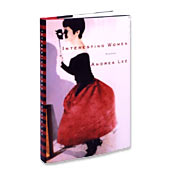
Is it a story about black people and white people, or men and women? the narrator wonders at the end of “The Pulpit,” one of the tales in Andrea Lee’s new collection, Interesting Women. It’s a question you might be tempted to ask about the whole book, much of which concerns tensions between whites and blacks, Americans and Europeans, who happen to be married to each other. The narrator of “The Pulpit” is (like Lee herself) an upper-middle-class, Harvard-educated black woman; she’s reminiscing, in a condescending way, about her white ex-husband, who once helped register black voters in Alabama – and stole a kiss from the black preacher’s daughter. And yet it’s the kiss, rather than the voter registration, that lingers in the narrator’s mind at the end of the story. That emphasis turns out to be typical. The best pieces in this often incisive collection make clear that whatever the character’s color may be, the real subject here is the conflicts and negotiations not between races but between genders.
Mixed marriages prove to be fertile territory for the author’s distinctive tone of amused psychological astuteness. Lee, a former New Yorker staff writer, has lived in Italy with her Italian husband and their two children for some time; many of the stories here are about American women (white or black) grappling with the strangeness of Italian husbands. This cultural difference between Americans and Italians is an excellent vehicle for talking about something even more profound: the fundamental mysteriousness of men and women to each other. What makes Lee an interesting writer is that she’s canny enough to realize that such opacity doesn’t necessarily spell disaster. In “The Birthday Present,” a young second wife gives her Italian husband a birthday surprise – a night with two call girls – that ends up solidifying her marriage. In “Sicily,” another American wife is constantly on the verge of fighting with her Italian husband during a visit to the island. (He wants to watch the local fishermen’s annual slaughter of tuna, which she finds barbaric.) Yet for all its pervasive stench of bloody fish, this story ends with a character delighting in “a mouthful of sugar,” as if to suggest that it’s differences as well as similarities that make relationships sweet.
If Lee knows a thing or two about being a stranger in a strange land, it’s not just from being an expat. In “The Golden Chariot,” a middle-class black family takes a cross-country trip from Philadelphia to Seattle in 1962; there’s a wonderful line at the end of the story about the “ambiguous shape” of the citizenship of black Americans, who “moved across our country feeling as apprehensive as foreigners and at the same time knowing that every grain of dust was ours.” That appreciation of paradox marks the author’s best writing – and may well explain her life, too. In “Anthropology,” an article she wrote about her high-caste, pale-skinned Southern relatives’ reaction to an article she’d written about them (in which she called them “black”), the author acknowledges the frustrations of living in a country that reduces everything to white or black; she quotes her scholar cousin on the subject of “sensible countries where they accept nuances.”
The stories that are overtly about race, however, don’t have the cool humor or, indeed, the nuances that you find in her stories about Italy. “Dancing With Josefina” is typical: In it, a preppy black American, vacationing with her white husband, encourages an old white guy to think she’s an island girl who can be had for the price of a Coke, only to reveal who she really is on the final page (“I’m not an exotic dream, not a victim”). But it’s a hollow victory for author and character alike, precisely because the whole tale is so obviously concocted to lead to that triumphant line.
Such stories lack the subtlety of emotion and vividness of detail you get in the collection’s finest tale, “Winter Barley,” about a rueful May-December romance between a young American and an elderly European aristocrat. If the fresh-faced Elizabeth and crusty old Edo don’t end up together at the end, that’s just as well: For all her American optimism about life and love, Lee has a bracing, old-world loathing of sentimentality, and it’s the latter that informs so many of the terrific apercus about relationships here (“Like all second wives, Ariel was supposed to be a solution, and now she has simply enlarged the problem”). Like many of the unions you find in her new collection, Lee’s idiosyncratic marriage of seemingly opposite traits is well worth celebrating.
Interesting Women
By Andrea Lee.
Random House; 222 pages; $22.95.